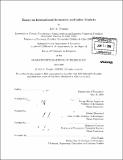| dc.contributor.advisor | George-Marios Angeletos, Oliver Blanchard and Francesco Giavazzi. | en_US |
| dc.contributor.author | Tessada, José | en_US |
| dc.contributor.other | Massachusetts Institute of Technology. Dept. of Economics. | en_US |
| dc.date.accessioned | 2008-12-11T18:27:07Z | |
| dc.date.available | 2008-12-11T18:27:07Z | |
| dc.date.copyright | 2008 | en_US |
| dc.date.issued | 2008 | en_US |
| dc.identifier.uri | http://hdl.handle.net/1721.1/43784 | |
| dc.description | Thesis (Ph. D.)--Massachusetts Institute of Technology, Dept. of Economics, 2008. | en_US |
| dc.description | Includes bibliographical references (p. 135-138). | en_US |
| dc.description.abstract | This thesis consists of three separate essays related to international economics and labor markets. The first essay, with Francisco Gallego, looks at sudden stops, a main feature of developing countries in the last decades, and their effects on these countries. Using sector-level data on job flows for four Latin American countries, we find that sudden stops are associated with lower job creation and increased job destruction. Sectoral effects are related to financial indicators: sectors with higher dependence on external financing experience lower creation and sectors with high indicators of liquidity needs experience larger destruction. These results provide evidence of financial conditions being an important transmission channel of sudden stops within a country. The second essay, with Patricia Cortés, studies whether low-skilled immigration has led high-skilled American women to change their time use decisions. We find evidence that low-skilled immigration has increased hours worked by women with a graduate degree, especially those with a professional degree or a PhD and those with children. Our estimates suggest that the low-skilled immigration flow of the 1990s increased by 7 and 33 minutes a week the average time of market work of women with a Master's and a professional degree or a PhD, respectively. Low-skilled immigration increases the fraction of high-skilled women working more than 50 (and 60) hours a week, but decreases their labor force participation. Consistently, for these women, a decrease in the time spent in household work and an increase in reported expenditures on housekeeping services. Low-skilled immigration does not affect other education groups, except for a negative effect on labor supply. | en_US |
| dc.description.abstract | (cont.) The third essay focuses on the effects of trade in services, modeled as formation of international production teams, in a diversity and trade model a la Grossman and Maggi (2000). For the two country case it is shown that when the tails of the countries' talent distributions satisfy a "similarity" condition, then free trade in goods replicates the integrated equilibrium. However, this condition is strong and it implies that generally international teams will change the allocation of agents, when trade in goods is already possible. | en_US |
| dc.description.statementofresponsibility | José A. Tessada. | en_US |
| dc.format.extent | 138 p. | en_US |
| dc.language.iso | eng | en_US |
| dc.publisher | Massachusetts Institute of Technology | en_US |
| dc.rights | M.I.T. theses are protected by
copyright. They may be viewed from this source for any purpose, but
reproduction or distribution in any format is prohibited without written
permission. See provided URL for inquiries about permission. | en_US |
| dc.rights.uri | http://dspace.mit.edu/handle/1721.1/7582 | en_US |
| dc.subject | Economics. | en_US |
| dc.title | Essays on international economics and labor markets | en_US |
| dc.type | Thesis | en_US |
| dc.description.degree | Ph.D. | en_US |
| dc.contributor.department | Massachusetts Institute of Technology. Department of Economics | |
| dc.identifier.oclc | 261135753 | en_US |
